Elmhurst’s Non-Domestic Energy Assessor Training courses, will give you the skills and qualifications to assess the energy efficiency of the UK’s commercial buildings, including offices, shops, and factories.
You’ll learn how to accurately produce Commercial Energy Performance Certificates (EPCs) using specialist online/desktop software. These training courses are suitable for those new to or familiar with the world of energy/building assessment.
✅ Play a critical role in the drive towards net zero
✅ Work for yourself- control your work/life balance
✅ Supplement your existing income, or build a completely new business
✅ Seek employment opportunities with existing energy assessment organisations
✅ Expand inhouse skills and knowledge in commercial energy assessment
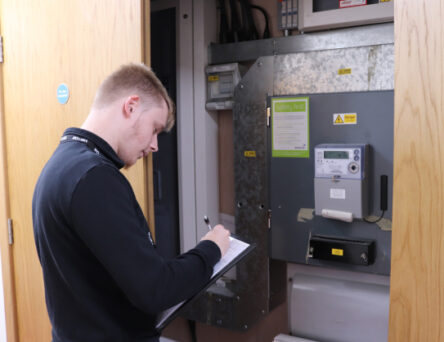
Online NDEA (Level 3 & 4) Training
Enjoy expert-led, interactive online training from the comfort of your home or office.
Elmhurst offers two online training routes to becoming a qualified NDEA, depending on your experience: the New Entrant Route and the APEL Route for experienced practitioners.
| New Entrant Route | APEL Route | |
| Cost | £1,670 + ABBE Reg Fee + VAT | £995 + VAT |
| Duration | 5 Days | 2 Days |
| Location | Online | Online |
| Format | Live, instructor-led sessions via Zoom | Live, instructor-led sessions via Zoom |
| Portfolio Completion | Full portfolio of work required including completion of three test cases during training, followed by two, carried out independently after training on Level 3 & 4 buildings. | Test cases only |
| Ideal for | New non-domestic learners who are confident learning remotely and independently. | Learners working in the sector with relevant experience and evidence of prior learning. |
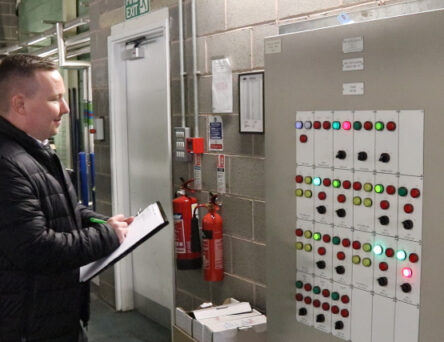
Classroom NDEA (Level 3 & 4) Training
£2,120 + ABBE Reg Fee + VAT
Elmhurst’s classroom-based NDEA training is a fantastic option for those who prefer learning in person, with plenty of hands-on support, expert guidance, and the chance to ask questions face-to-face.
- Duration: 5 Days
- Location: Multiple
- Format: Face-to-face, instructor-led training
- Portfolio Completion: Same as Online New Entrant Course
- Ideal for: New entrants to the non-domestic sector who prefer structured, in-person learning with opportunities for direct tutor engagement and peer discussion.

On Demand NDEA (Level 5) Training
From £160 + VAT
Learn how to produce accurate Level 5 Commercial EPCs using DesignBuilder’s Dynamic Simulation Modelling (DSM) interface with this flexible, self-paced on demand training.
- Duration: Approx. 7 hours (Certified CPD)
- Format: On Demand, self-paced with interactive checkpoints
- Ideal for: Qualified NDEAs or experienced DesignBuilder SBEM users looking to upskill to Level 5 DSM
- Pre-requisites: Completion of the DesignBuilder SBEM for UK Certification course or a minimum of 10 certified UK buildings using DesignBuilder SBEM, with strong familiarity with the SBEM manual (self-certification accepted)
- Exam: A separate open-book exam must be completed to demonstrate competence in the DesignBuilder DSM interface.
What do Non-Domestic Energy Assessors do?
NDEAs are qualified to assess the energy efficiency of non-domestic/commercial buildings. Depending on the level of qualification held, an NDEA can assess anything from a restaurant to an office building in Canary Wharf.
An NDEA’s role will require them to carry out an onsite inspection of a building. During this inspection they will collect information such as building age, number of floors, heating, ventilation and air conditioning (HVAC), size of rooms etc. The assessment itself is non-invasive which means you won’t be drilling into any walls.
Once the initial site assessment is completed, NDEAs can then use specialist online/desktop software to calculate the energy performance of the property and produce a legally valid Commercial Energy Performance Certificate (EPC). NDEAs may also be expected to explain their findings to property owners, and advise them on ways to improve their energy efficiency.
The unique aspect of non-domestic energy assessment is the diversity of commercial buildings and that they vary greatly in size and complexity. Depending on your level of qualification you can choose to assess simple commercial buildings or take on the challenge of a more intricate structures, such as a skyscrapers or shopping centres. As a result, the duration of a full assessment can range from a few hours to several days, depending on the complexity of the building.
Interested to see what a typical day might look like for a Non-Domestic Energy Assessor?
Why Train with Elmhurst?
Invest in you. Build your career. Trust Elmhurst to take you further – because your success is ours too.
As the UK’s largest government-approved EPC accreditation provider, we have a genuine vested interest in your success, because our name is on your certificate. We don’t just train you and leave you to it; we continue to support you throughout your career with resources, CPD, technical support, and a strong professional community.
✅ Value. Choice. Speed. Support – Lasting value, industry-respected qualifications, and trusted support – all with the speed and flexibility to learn your way
✅ Expertise – Learn from fully qualified trainers with invaluable industry experience
✅ Adaptability – Courses shaped by industry needs and your feedback
✅ Personalised Support – Guidance tailored to your pace and style of learning
✅ Qualify with Confidence – Gain practical, real-world knowledge to thrive from day one
✅ Support Beyond Training – From NDEA accreditation to ongoing CPD, we’re with you every step of the way
You can see how we compare to other providers below.
SEE HOW WE COMPARE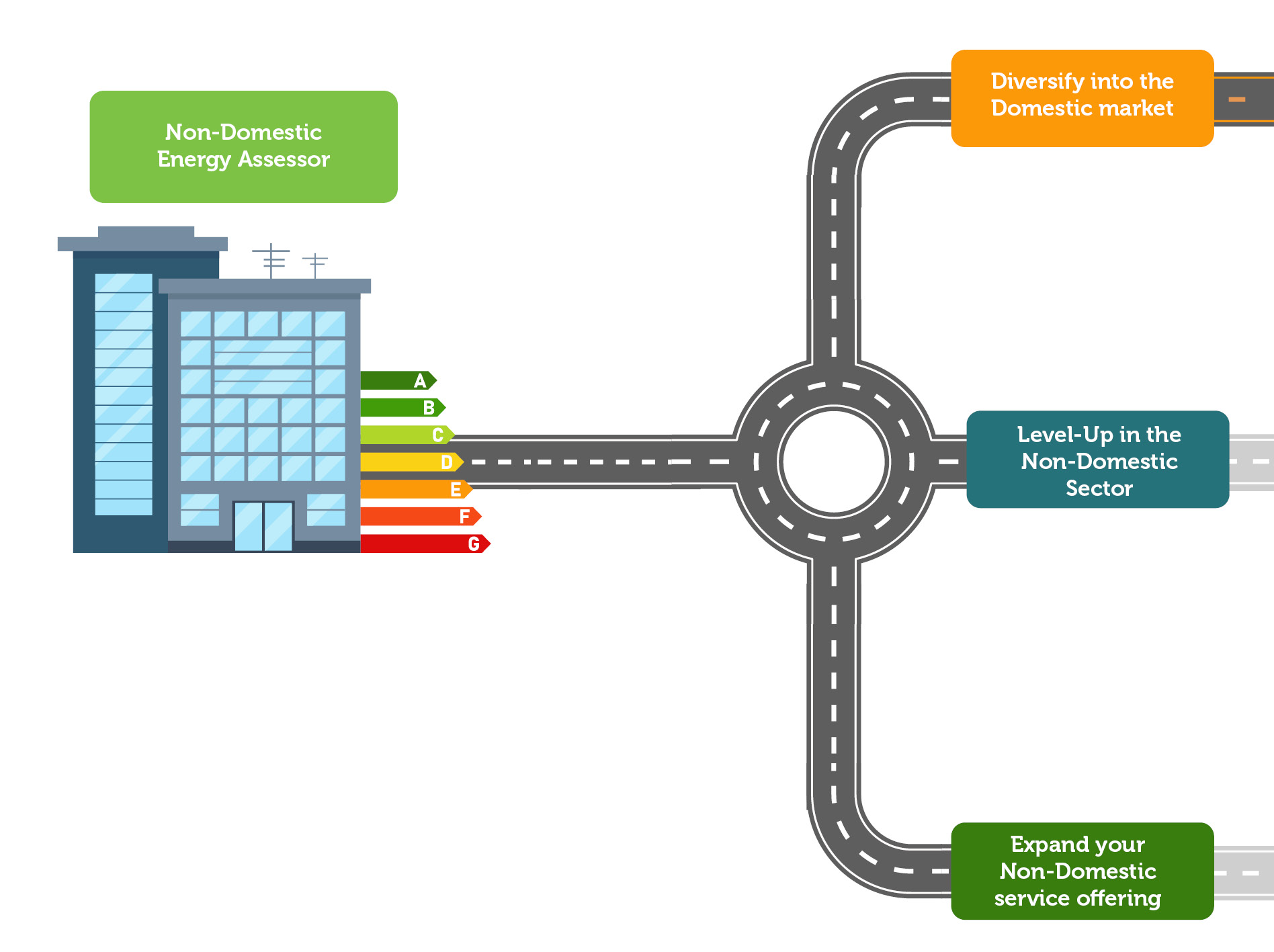
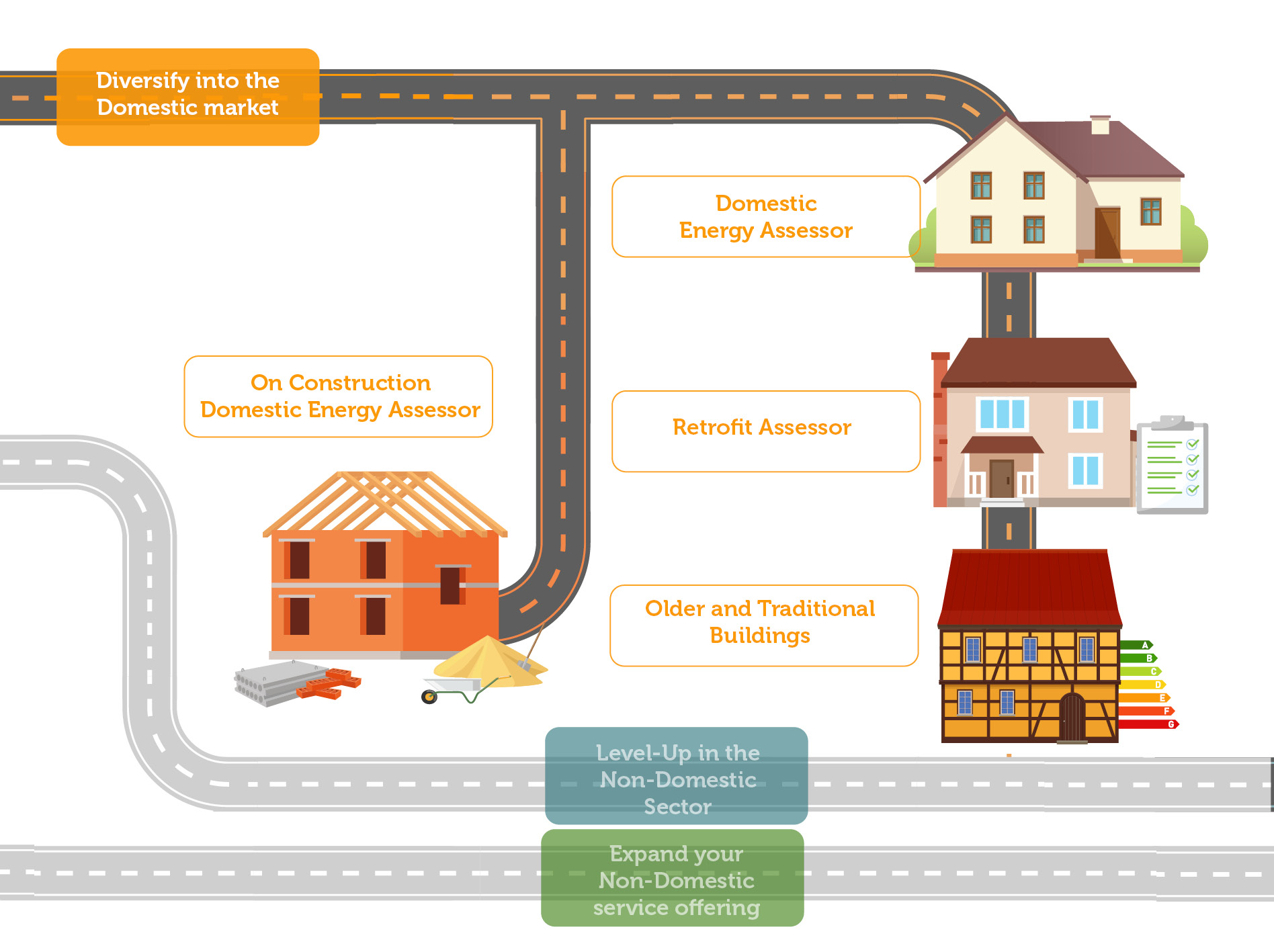
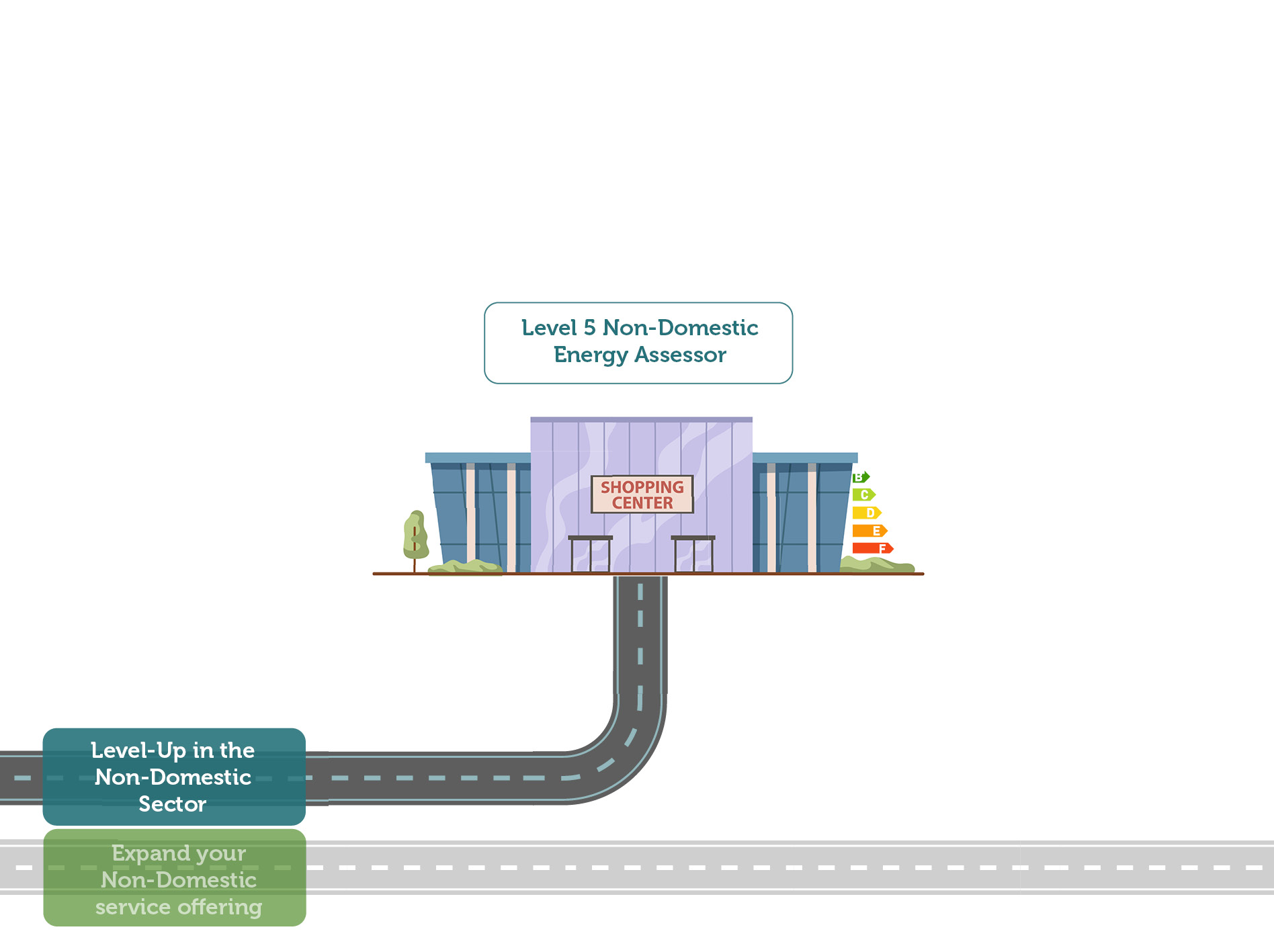
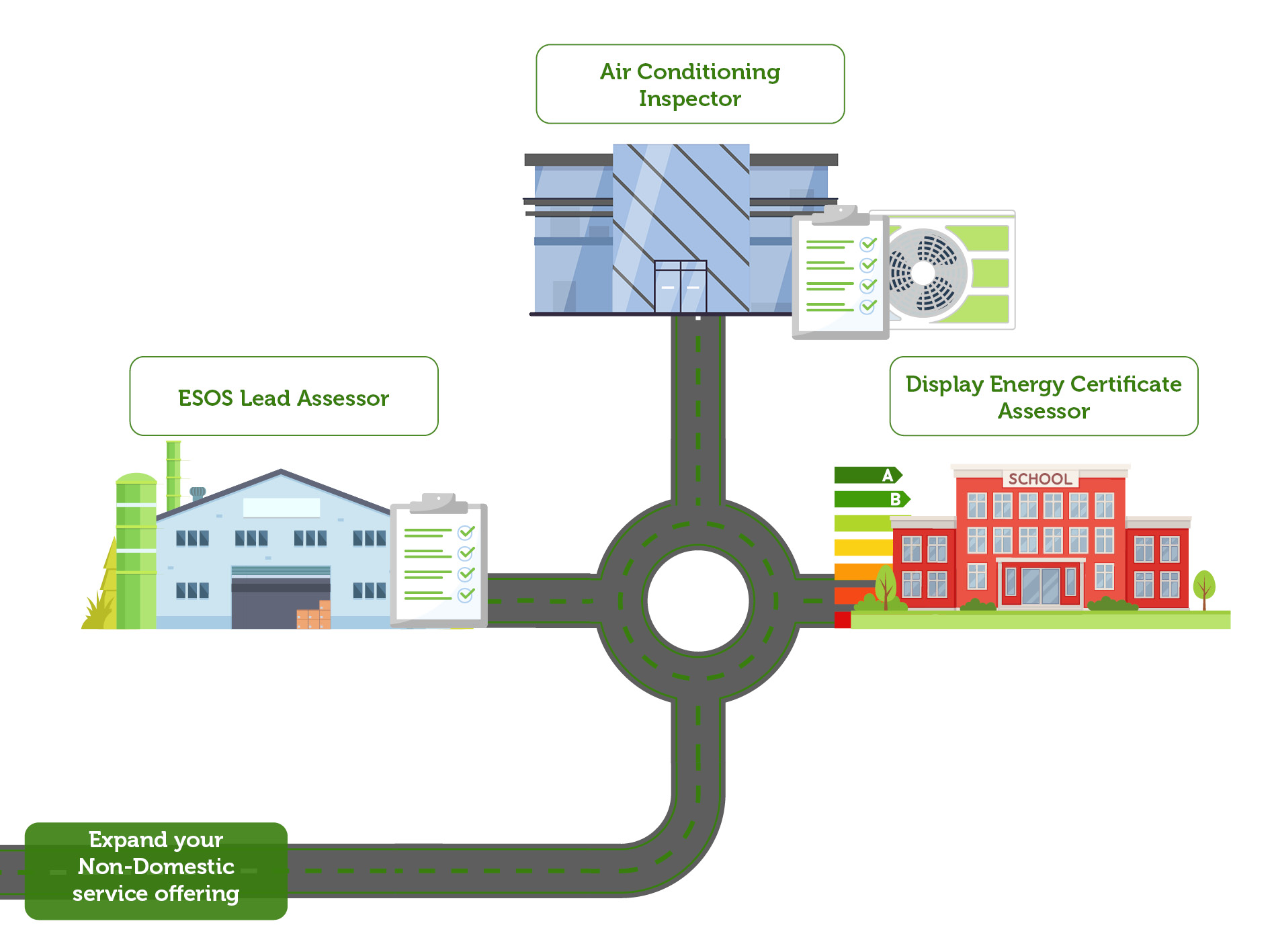
Frequently Asked Questions
The level of NDEA qualification reflects the complexity of commercial buildings found in the UK. For example if you have a level 4 diploma in Non-Domestic Energy Assessment you will be able to assess buildings which are classed as Level 4 and below. A simple description of each building type can be found below:
Level 3 commercial buildings are existing buildings with common characteristics and a simple air-conditioning system.
examples: small shops, restaurants
Level 4 commercial buildings have uncommon characteristics and will typically have more complex Heating, Ventilation, and Air Conditioning (HVAC) systems. Level 4 also covers any new build non-domestic building.
examples: Large office buildings, large shops
Level 5 commercial buildings will have more specific features such as atriums, automatic blind control and complex ventilation. In depth modelling software is required for these buildings in order to determine their energy performance.
examples: Airports, Shopping Centres, Skyscrapers
No specific qualifications or previous experience is required in order to become a NDEA.
An interest in buildings and energy efficiency will keep you engaged in this role, and good math knowledge can certainly help anyone to succeed as a NDEA- however it is by no means essential.
Those involved in other areas of building/energy assessment or building service engineers may find it easier to step into this role.
NDEAs can earn anywhere between £18,000 and £41,000 depending on their experience.
For those who choose to work self-employed, What they earn will depend on a number of different factors, such as the level of local competition, the frequency of assessments, as well as the size and complexity of the buildings being assessed.
Landlords and property agents who are selling or letting their commercial buildings will require a non-domestic EPC. If you are level 4 trained you can also undertake energy calculations and produce an EPC for new build commercial buildings.
Training will take place over a number of days, in order to give you a solid understanding of the role.
Once concluded you will need to undertake an exam as well as additional on site assessments in order to complete your professional portfolio (Elmhurst run practical survey days which can help you fulfil the requirement of an on site assessment).
On average the process to become fully qualified can take up to 6-8 weeks.
The demand for qualified NDEAs continues to increase, as the government aims to improve the energy efficiency of UK building stock.
As an NDEA you can choose to operate as a self-employed professional, or can seek employment with energy consultancy and surveying firms. Some of these opportunities can be viewed on Elmhurst’s opportunities page as well as on online job boards.
NDEAs could also pursue opportunities in low carbon assessments/consultancy, sustainability, and energy management.
In addition to this, we recommend looking at Display Energy Certificate (DEC) Assessor and ESOS Lead Assessor training courses as these link quite well with the NDEA role and will allow you to expand your own skills and service offering.
In order for a NDEAs to produce a legally valid EPC, they must be accredited with a government approved energy assessment scheme- such as Elmhurst.
Accreditation schemes are there to support members in their practice, by providing them with ongoing technical guidance, training and software. They are also required to monitor the work of NDEAs through regular auditing- this ensures quality within the industry.
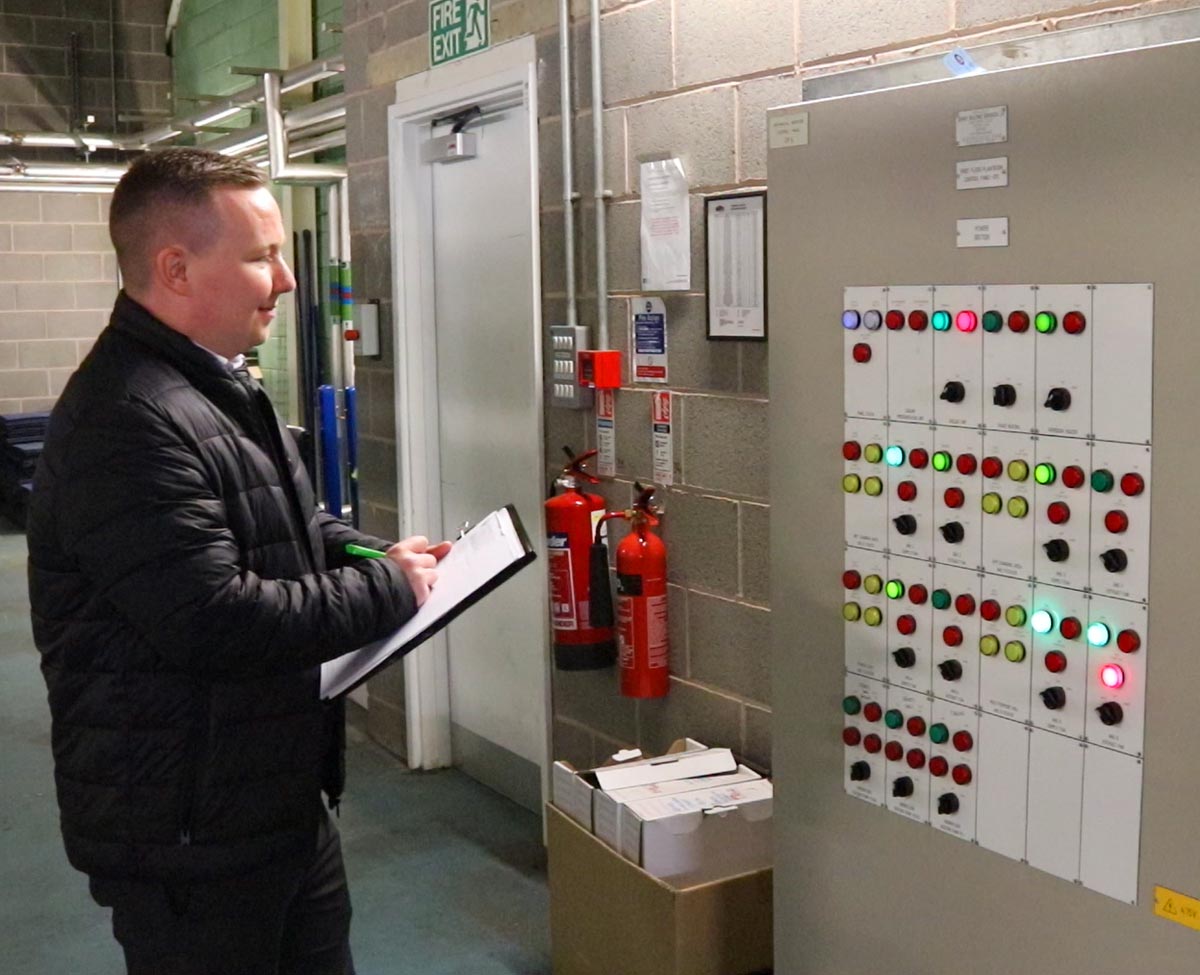
Become a Member with Elmhurst
Once qualified as an NDEA, you will be eligible to join Elmhurst’s industry leading accreditation scheme, free of charge.
If you are looking for a scheme which offers competitive lodgement fees, market leading software, professional technical support, opportunities to enhance your skills, as well as the tools to build a competitive business, then Elmhurst Energy is the accreditation scheme for you.
FIND OUT MORE >





